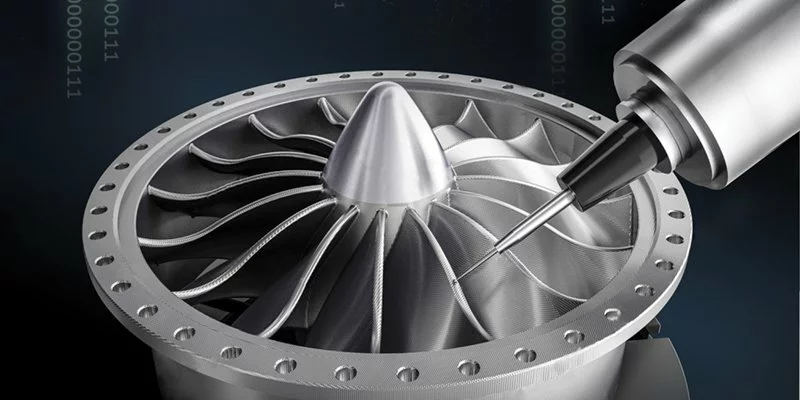CNC machining has transformed modern manufacturing by enabling the precise creation of complex geometries in industries like automotive, machine building, and automation. When machining intricate designs, following best practices ensures efficiency, accuracy, and cost-effectiveness.
At CNCRUSH, a leading CNC machining provider with over 12 years of experience, we specialize in high-quality CNC milled and turned parts, handling complex geometries with precision. This comprehensive guide will explore essential best practices for CNC machining complex geometries.

Understanding CNC Machining Complex Geometries
Machining complex geometries involves producing parts with intricate shapes, tight tolerances, and challenging features like deep cavities, undercuts, and thin walls. Successfully handling these complexities requires optimized designs, material selection, and machining strategies.
Chart 1: Material Selection for CNC Machining
| Material Type | Strength | Machinability | Common Applications |
|---|---|---|---|
| Aluminum | Medium | High | Automotive, Aerospace |
| Stainless Steel | High | Medium | Medical, Marine |
| Titanium | Very High | Low | Aerospace, Medical |
Chart 2: Tooling and Speed Considerations
| Tool Type | RPM Range | Suitable Materials | Common Use Cases |
| End Mill | 5000-10000 | Aluminum, Plastics | General Purpose Milling |
| Ball Nose Mill | 4000-8000 | Steel, Titanium | Complex Surface Finishing |
| Face Mill | 6000-12000 | Aluminum, Brass | Surface Flattening |
1. Design Considerations for Complex Geometries
A well-optimized design can significantly improve manufacturability and reduce production costs. Key principles include:
- Simplify Designs: Remove unnecessary features to improve efficiency while retaining part functionality.
- Consistent Wall Thickness: Maintain uniform walls to avoid warping and ensure structural integrity.
- Avoid Sharp Internal Corners: Use filleted corners to reduce stress concentrations and improve tool accessibility.
At CNCRUSH, we collaborate with clients during the design phase to optimize complex geometries for manufacturing success.
2. Material Selection for Complex CNC Machining
Material properties impact the machining process and final part quality. Consider the following materials:
Metals:
- Aluminum: Lightweight and highly machinable, ideal for automotive components.
- Steel: Strong and durable for heavy-duty parts.
- Brass: Corrosion-resistant and easy to machine for precision components.
Plastics:
- ABS: Impact-resistant and versatile.
- POM (Delrin): Stiff with low friction.
- PTFE (Teflon): Chemically resistant and ideal for specialized applications.
We help clients select the optimal materials for their specific applications, balancing machinability and performance.
3. Tool Selection and Path Optimization

Proper tool choice and optimized tool paths are essential for precision and efficiency. Considerations include:
- End Mills: For slots and profiles.
- Ball Nose Cutters: For 3D contours.
- Thread Mills: For flexible threading options.
Tool Path Strategies:
- Adaptive Clearing: Maintains consistent tool engagement.
- Rest Machining: Targets unmachined areas for complete material removal.
- High-Speed Machining: Enhances surface finish and reduces machining time.
CNCRUSH utilizes advanced CNC machines and programming strategies to optimize tool paths for complex parts.
4. Importance of Tolerances in Complex Machining
Tolerances define acceptable deviations from nominal dimensions. Overly tight tolerances can increase costs without functional benefits.
- Standard Tolerances: ±0.005 inches for metals, ±0.010 inches for plastics.
- Critical Tolerances: Apply tighter tolerances only when functionally necessary.
We collaborate with clients to balance functional accuracy with cost-efficiency.
5. Surface Finish Considerations

Surface finish affects both aesthetics and functionality. Best practices include:
- Material-Specific Finishes: Aluminum can be anodized for corrosion resistance, while steel can be polished or coated.
- Minimizing Tool Marks: Use fine-step toolpaths for better surface quality.
6. Workholding Techniques for Complex Geometries
Secure workholding is essential for precision in complex parts. Techniques include:
- Custom Fixtures: Designed for unique part shapes.
- Vacuum Chucks: Ideal for flat, thin parts.
- Soft Jaws: For delicate components.
CNCRUSH engineers design custom fixtures to ensure secure and precise machining.
7. Multi-Axis CNC Machining Advantages

Multi-axis CNC machining enhances capabilities for complex geometries:
- 3-Axis Machines: Suitable for simpler components.
- 4-Axis Machines: Allow rotation along one additional axis.
- 5-Axis Machines: Provide maximum flexibility for complex parts.
Our facility includes 3-axis, 4-axis, and 5-axis CNC machines to handle a wide range of complex components.
8. Quality Control Measures
Quality assurance is crucial when machining complex parts. Key steps include:
- CMM Inspection: Ensures precise dimensional accuracy.
- First Article Inspection (FAIR): Verifies the initial production run.
- In-Process Inspections: Ongoing checks during machining.
At CNCRUSH, our inspection equipment includes CMM, height gauges, micrometers, and hardness testers to ensure high-quality parts.
9. Cost Management Strategies
Controlling costs in complex CNC machining involves:
- Batch Optimization: Larger production runs reduce per-unit costs.
- Material Efficiency: Minimize material waste through optimized nesting.
- Collaborative Design Review: Identify cost-saving design adjustments.
We work with clients to identify cost-saving opportunities without compromising quality.
10. Partnering with a Reliable CNC Machining Supplier
Choosing the right CNC machining partner is critical for handling complex geometries. CNCRUSH offers:
- Advanced CNC Equipment: 3-axis, 4-axis, and 5-axis machining centers.
- Experienced Engineers: Over 12 years of CNC machining expertise.
- Comprehensive Quality Control: FAIR, CMM inspections, and detailed reporting.
Conclusion
Machining complex geometries requires expertise in design optimization, material selection, tool path strategies, and quality control. At CNCRUSH, we specialize in producing high-precision CNC components tailored for industries like automotive, machine building, and automation.
If you’re seeking a reliable CNC machining partner for complex parts, contact us at info@cncrush.com or visit our website at cncrush.com to learn more about our services.
